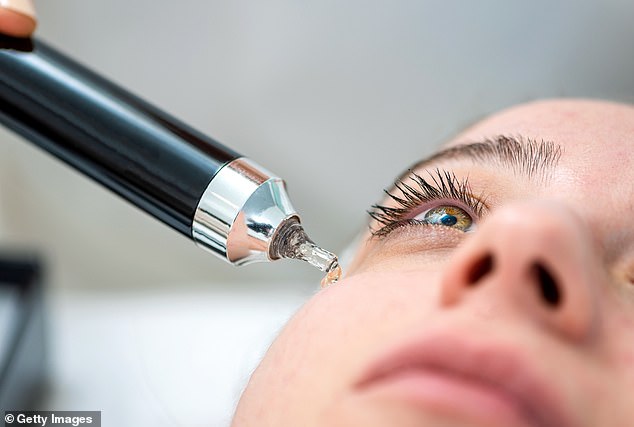A gel has been developed that is injected into the eye to treat the most common cause of vision loss in people over 50, for which there are currently no treatments.
The injection contains donated umbilical cord blood and is designed to rejuvenate cells in the retina, the light-sensitive area at the back of the eye.
The treatment is for dry age-related macular degeneration (AMD), which occurs when deposits called drusen (made up mostly of waste products) build up on the retina while the macula, the central area of the retina, thins, leading to a gradual loss of central vision.
The injection contains donated umbilical cord blood and is designed to rejuvenate cells in the retina, the light-sensitive area at the back of the eye.
Early results from ongoing trials show the macula becomes thicker in eyes treated with the gel, suggesting it could slow degeneration and vision loss. An estimated 700,000 people in the UK have AMD. There are two types – wet and dry – but around 90 per cent of cases are dry AMD, which usually develops gradually. Symptoms can include visual distortions, such as straight lines appearing bent, and reduced central vision which can make it difficult to see faces, read, drive or do close work.
This can develop into wet AMD, when blood vessels grow into the macula, leaking blood and fluid, which can lead to rapid vision loss over months or even days. There is treatment for wet AMD, with periodic injections of a drug to stop new blood vessels from developing, but these will not restore vision.
There is no treatment for dry AMD, although vision aids, such as magnifying glasses, may help.

Dr Gwyn Williams, consultant ophthalmologist at Singleton Hospital in Swansea, says existing treatments for other eye diseases use tissue taken from the placenta.
For the new ongoing trial, researchers at Rome’s Policlinico Universitario Foundation are administering injections of platelet-rich plasma (PRP) extracted from donated umbilical cord blood to 36 patients with early-stage AMD.
PRP is a mixture of blood cells (called platelets) and plasma, the liquid element of blood, and is made by spinning blood at high speed, which produces a gel-like liquid.
Platelets contain growth factors that help heal wounds and repair damage to cells, and PRP injections have been used for a variety of conditions, including sports injuries and hair loss, since the 1970s.
Cord blood is particularly rich in platelets and growth factors and also contains higher levels of anti-inflammatory compounds. Inflammation is thought to be involved in retinal cell death in dry AMD and previous studies have shown that AMD patients have higher levels of C-reactive protein in their blood, a marker of inflammation.
The 36 patients participating in the trial will receive between four and twelve PRP injections in one eye. A sham injection will be administered to the other eye, which will serve as a comparison point to evaluate the effects of the treatment.
In an earlier trial involving 13 patients to evaluate the safety of the injections, no side effects or complications were observed, and after six months, the macula in untreated eyes was thinner than in treated eyes. Full results will appear in the November issue of Ophthalmology Science.
Dr Gwyn Williams, consultant ophthalmologist at Swansea Bay University Health Board and Singleton Hospital, says existing treatments for other eye diseases use tissue taken from the placenta, adding: “The technology here is very personalised.”
“Effective treatments for wet AMD have been available for two decades, but so far there is nothing for patients with dry AMD, which is much more common. This is exciting research.”
- Curcumin, the main active ingredient in turmeric, may help treat age-related macular degeneration (AMD). The Journal of Personalised Medicine reports that the compound has promising effects in animal and laboratory research: It is thought to reduce inflammation and thus prevent retinal cell death.

